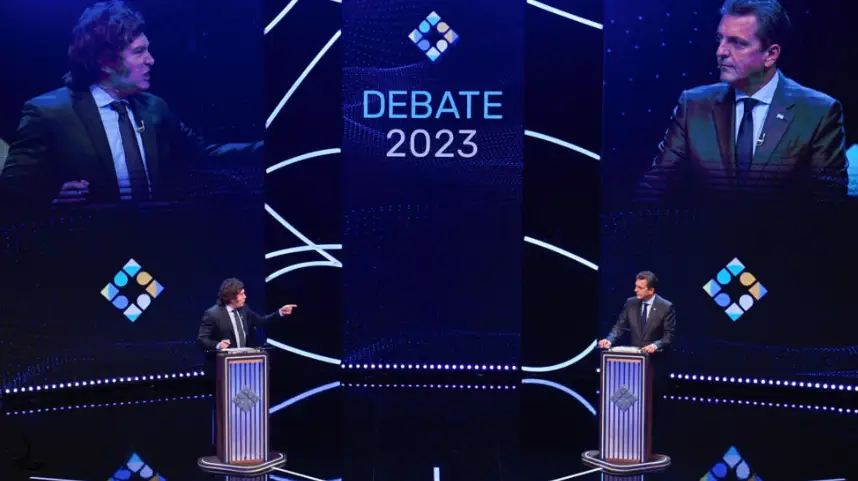On November 19, Argentina will elect its president in a second ballot. This process will be between the candidate of the current government, Sergio Massa — Union for the Fatherland —, and the outsider Javier Milei, creator of the libertarian party Liberty Advances. Both surprisingly reached this stage: Javier Milei was the winner of the Open Primary Elections (PASO) in August, where Massa came third. Sergio Massa after the first round in October where he recovered and came first, displacing Milei to second place and leaving out of the race the previous favorite, Patricia Bullrich, of the pro-Macri supporters Together for Change.
Sergio Massa is an ambitious politician who has been climbing for years in Argentine politics and who some of the electorate and press label him as an opportunist. In this escalation, and from his position as Minister of Economy despite not being an economist, he carried out a campaign based mainly on two issues: on the one hand, detaching himself from Kirchnerism, basically from Cristina Kirchner, due to her high rejection among the electorate, and, on the other hand, with economic decisions that can clearly be labeled as “distribution of resources to win votes” (in the media it is called “Plan Platita”).
Javier Milei represents that new phenomenon, at least new in becoming a competitive player, in global politics, called libertarianism. The common denominators of libertarianism are, basically, economic ultra-liberalism, extreme individualism, and, above all, a furious reaction to the demands of the new left: gender, sexual diversity, multiculturalism, and environmentalism.
In other words, Argentina’s second round of voting will no longer take place in the classic confrontation between Peronism and anti-Peronism, or between Kirchnerism and anti-Kirchnerism. Two new species, especially Milei’s, will face each other.
The polls war, a war that is not a competition for veracity but marked by political calculation, shows a permanent parity, something logical in a second ballot. The most widespread social sense thinks, and intuits, that a victory of Milei is almost impossible since it constitutes a leap into the void. A victory that will prevent that, beyond sympathies, affinities, or tiredness, a part of the electorate ends up voting for the lesser evil, which is Massa, who, it should be noted, is the object of distrust by outsiders, but also in part of his proximity. Máximo Kirchner himself is said to have said: “Massa is going to ruin us”.
Many opinion polls agree that the majority of votes for Milei, not disproportionately but clearly, are for men more than for women. In addition, they add the fact, which is a source of sociological and political analysis, that among the male preferences for voting for Milei, age differences stand out: the younger ones (around 35 years old) are more inclined to vote for Milei.
Javier Milei is the outsider who proposes not an anti-politics but a politics where it is necessary to eliminate everything that, in his opinion, has hindered the individual and, therefore, the productive forces of the country for a century. For his part, Sergio Massa was elected Minister of Economy in the worst economic moment of the country in the past two decades, only to become the center of an exhausted and weakened government. Even though economic and socioeconomic indicators have worsened drastically in the last year, Massa is indeed the central figure of the ruling party for this election.
Massa carries out the second ballot campaign knowing that he has no political results to offer and, advised in this part of the campaign by Lula’s ex-consultants, displaying a measured, hopeful discourse of change (from within the ruling party, which is to say from Kirchnerism), and calling for a government of unity, that is to say, composed of people of different political strands.
Milei, who emerged from the anger and fury of those who are not only in a bad current situation but who lack future expectations — hence the predominantly young vote for him —, faces this second round lowering the levels of shouting and aggression of the October election campaign. He is maintaining his central positions and calling to expand his electorate based on his alliance with former President Mauricio Macri, an alliance forged by Macri himself and which, it is assumed, could attract a large portion of the vote to Together for Change in October.
An iron’s presidential second ballot. One is the candidate “who was left behind”, that is to say, neither sought nor wanted by the political space he represents, which, ten years ago, Massa denounced and called “corrupt and ñoquis” (the latter term refers to fictitious state employment but with a salary for his political militants).
The other candidate is an emergent of anger, with no political structure or party of his own, with a motley staff from which some surreal and fear-generating statements and proposals emerge. Argentina, in economic and social crisis, found its political crisis in an almost disproportionate way.
*Translated by Janaína Ruviaro da Silva from the original in Spanish.











